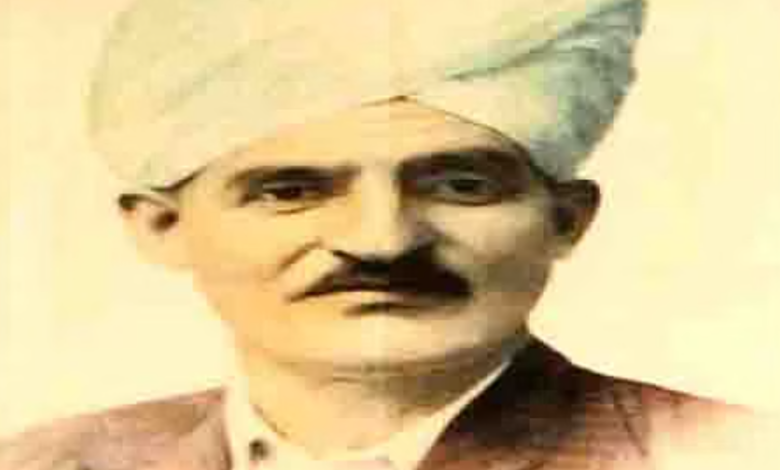Mehjoor – ‘Prodigy of Kashmir

FAROOQ AHMED PEER
Mahjoor, the poet of Kashmir was born on 11 August 1887 and died on 9th of April 1952. His actual name was Peerzada Ghulam Ahmad and his father’s name was Peerzada Abdullah Shah.
He was a patwari by profession and possessed great power of imagination which he used in creating art with distinction. It was this ability that earned him the title of the Poet of Kashmir.
His contemporary writers/ poets were, Zinda Koul, Abdul Ahad Azad and Dinnath Nadim He is noted for introducing a new style into Kashmiri poetry which pushed it into great realms of art created for arts sake.
He introduced his pen name Mahjoor when he visited Punjab and started writing poetry under the influence of great Urdu poet, Shibli Noamani. He followed in the academic footsteps of his father, who was a scholar of Persian language.
He received the primary education from the Maktab of Aashiq Trali (a renowned poet) in Tral. After passing the middle school examination from Nusrat-ul-Islam School, Srinagar, he went to Punjab where he came in contact with Urdu poets like Bismil Amritsari and Moulana Shibli Nomani.
He returned to Srinagar in 1908 and started writing in Persian and then in Urdu. But he was more interested to writing in his native language to express his emotions. He spent his free time writing poetry, and his first Kashmiri poem ‘Vanta hay Vesy’ was published in 1918
The ability and proficiency of Mahjoor as a leading twentieth century Kashmiri poet has been accepted by all in the state as well as in the country. He is great because he symbolizes the brilliance of the Romantic movement of the Kashmiri literature.
An extended glance at the collections of his poetry divulges the fact that he is unquestionably, an unswerving writer who does not confine himself to the inadequate precincts of commitment and that his poetic contribution is a convergence of various impacts and aspects.
He in his poetry exhibits such elements which surface in the literary contributions of the greatest poets of English as well as Urdu literature. He continuously wrote his beautiful and glamorous verses in Kashmiri and wrote many lyrics romantic in taste.
One among these famous lyrics is ‘Bage Nishat ke Gulo’ the verses of which activate excitement in the hearts of the readers. He had deep interest in the bounty of nature in Kashmir and he invariably depicts the scenic gardens, moors, forests, waterfalls, rivers, lush green fields and mountains as a source and means of conveying his heartfelt emotions and messages to awaken his countrymen to raise their voice against all kinds of injustices and ills perpetuated against them. He expresses his emotions in this manner;
“Bulbulan Dup Gulls Hussan Chui Pur
Keyha wanai, zew chai ne, su chui kasur”
Through his verses in Kashmiri, Mahjoor contributed to the sentiment and movement of freedom struggle during the tyrannical and autocratic Dogra regime.
His poems gave momentum to the struggle and served as a clarion call to the masses to free their nation from the chains of slavery. He express his patriotic fervor in the poem “Walo Ho Bage-e-Wano” and stresses upon his fellow countrymen to embellish their nation and land with the flowers of honour and dignity.
In other beautiful poem, “Gulshan Watan Chu Souni” Mahjoor expresses his love for his nation and breathes out the idea symbolically and that too with candor and pride that there is nothing dear to him than his nation.
“Bulbul wanan chu poshan gulshan watan chu souni
Andi andi safaid sangar deware sange mar mar”
There is no doubt that the themes of the poetry of Mahjoor involved freedom and progress in Kashmir and his poems awakened latent nationalism among people against the regime of those times.
His popular verses engaged such topics as love, communal harmony, social reform, and the plight of the Kashmiris. He also wrote on such timeless themes as youth, the flowers of Nishat Garden, peasant girls, gardeners, and the blond shades.
He is considered as a poet who revolutionized the traditional forms of poetry which put him in the company of great poets of the valley.
Mahjoor through his immortal verses teaches lessons about nature, love, peace, unity, faith in God, upholding of human values, uselessness of strife, jealousy and hatred. His poems reveal that he is a poet with lofty ideals and aspirations.
His works bring home the point that his poetry derives power from the intensity and sincerity of his experiences. It establishes the fact that what comes from the heart goes to the heart taking the form of appealing artistic creations.
He is simple and writes with great variety and it is due to this distinct artistic quality that he has been able to write lyrics, songs, odes, elegies, prose, biography, novel, translations, and criticism.
Mehjoor, stands out as a poet par excellence for his valuable contribution towards Kashmiri poetry. He could be easily called as the harbinger of modern Kashmiri poetry, because he widened and diversified its parameters, enriched its language and extended its use of idiom and put it on the pedestal of vibrancy and exuberance.










